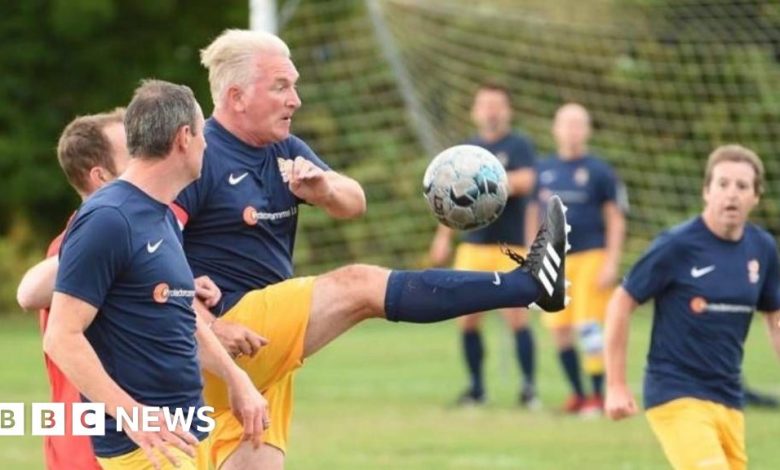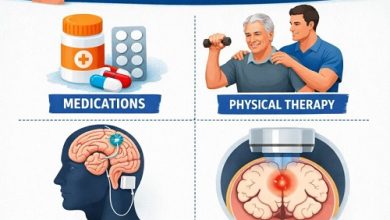How Football Players with Parkinson’s Are Inspiring a New Generation

In the high-adrenaline world of football, players are often seen as symbols of peak physical performance, resilience, and mental strength. Yet, when the challenges extend beyond the pitch — when an incurable neurological condition like Parkinson’s disease enters their lives — these athletes redefine what it truly means to be strong. Football players living with Parkinson’s have become unexpected heroes, not just for their fans, but for millions across the globe who battle the disease daily. Through their courage, advocacy, and determination, they are inspiring a new generation to see Parkinson’s not as an end, but as a new beginning.
This is the story of resilience, transformation, and hope — a story about how football players with Parkinson’s are showing that the human spirit can rise above even the toughest of opponents.
Understanding Parkinson’s Disease
Before delving into the inspiring stories of footballers battling Parkinson’s, it’s important to understand the condition itself.
Parkinson’s disease is a progressive neurological disorder that affects movement and coordination. It occurs when nerve cells in the brain that produce dopamine — a chemical responsible for transmitting signals related to movement — begin to deteriorate. This results in symptoms such as tremors, stiffness, slowness of movement, and balance issues.
While Parkinson’s is most common in older adults, it can affect people of all ages, including athletes. There is currently no cure, but treatments like medication, physical therapy, and lifestyle changes can significantly improve quality of life.
For professional footballers, whose lives revolve around physical performance, such a diagnosis is devastating. Yet, some have chosen to face it head-on, using their platforms to raise awareness, advocate for research, and inspire countless others.
The Courage to Keep Playing
When a professional athlete is diagnosed with Parkinson’s, retirement often seems inevitable. The physical demands of the sport appear incompatible with the challenges of a degenerative condition. Yet, some players have defied those expectations — proving that passion, determination, and purpose can sometimes outweigh physical limitations.
Ray Kennedy: The Legend Who Fought in Silence
One of the most well-known footballers to battle Parkinson’s was Ray Kennedy, a Liverpool and Arsenal legend. Kennedy was diagnosed with Parkinson’s in the mid-1980s, shortly after his playing career ended. Known for his composure, intelligence, and skill on the pitch, Kennedy’s struggle became one of football’s most poignant stories.
Even as his health declined, Kennedy refused to retreat from the world of football. He continued to engage with fans, raise awareness, and inspire others with his grace under pressure. His story became a rallying point for those with Parkinson’s — showing that even a devastating diagnosis couldn’t erase the legacy of a great athlete or the dignity of a fighter.
Dave Clarke: A Captain with Unbreakable Spirit
Another inspiring figure is Dave Clarke, the former captain of the England blind football team. Clarke was diagnosed with Parkinson’s after retiring, but his response to the disease has been nothing short of heroic. Instead of retreating, he turned to advocacy, helping others navigate life with Parkinson’s and continuing to be active in the sporting community.
Clarke’s message is clear: Parkinson’s may change your body, but it doesn’t have to break your spirit. His ongoing work with charities and his efforts to inspire young players demonstrate how leadership transcends physical ability.
Redefining Strength: Beyond the Physical
Football has always celebrated physical excellence — speed, strength, agility, and endurance. But players with Parkinson’s are redefining what “strength” truly means. They are teaching the world that mental resilience, emotional intelligence, and courage in adversity are just as vital.
Mental Fortitude: The New Game Plan
Living with Parkinson’s requires an extraordinary level of mental toughness. The disease progresses slowly and unpredictably, demanding constant adaptation. Many footballers draw upon their experiences in the sport — discipline, teamwork, and perseverance — to face their new challenges.
Just as they once trained to perfect their touch or fitness, they now train their minds to stay positive, manage symptoms, and maintain hope. Their resilience becomes a powerful example for fans and young players alike, proving that true champions never stop fighting.
Community and Team Spirit
One of football’s greatest gifts is its sense of community. For many players with Parkinson’s, the support from teammates, fans, and fellow athletes has been life-changing. Charitable organizations, football clubs, and former colleagues have come together to raise funds and awareness, creating a powerful network of solidarity.
Events like charity matches, awareness walks, and Parkinson’s foundations run by former players continue to spread the message that no one battles Parkinson’s alone. This spirit of unity mirrors the camaraderie of the game itself — teamwork on a much larger, more meaningful scale.
How These Players Inspire a New Generation
Football players with Parkinson’s are doing more than fighting a personal battle — they are reshaping how society views both the disease and those who live with it.
1. Breaking the Stigma
Parkinson’s can be an isolating condition. Tremors, speech difficulties, and movement issues often lead to social withdrawal. But when public figures — especially celebrated athletes — speak openly about their diagnoses, they challenge these stigmas head-on.
Through interviews, documentaries, and public appearances, players have shown that Parkinson’s does not define a person’s worth or capabilities. Their openness encourages others to speak about their experiences and seek help without shame.
2. Promoting Early Detection and Awareness
Many footballers diagnosed with Parkinson’s emphasize the importance of early diagnosis. Catching the disease in its early stages can help slow progression and improve management. By sharing their journeys, these athletes raise awareness about early symptoms — such as subtle tremors, sleep disturbances, or balance problems — prompting others to seek medical advice sooner.
This awareness has ripple effects beyond football, encouraging communities worldwide to pay closer attention to neurological health.
3. Inspiring Adaptation Through Exercise
Physical activity plays a crucial role in managing Parkinson’s symptoms. Footballers who stay active — even after diagnosis — serve as proof that exercise is medicine. Their routines often include modified football drills, yoga, swimming, or boxing, all of which enhance mobility and reduce rigidity.
These stories motivate others with Parkinson’s to remain active, transforming what might seem like a limitation into a new lifestyle of empowerment and wellness.
4. Using Their Platform for Advocacy
Many former players have turned their personal battles into powerful advocacy efforts. By partnering with organizations like Parkinson’s UK, Michael J. Fox Foundation, and various football charities, they raise funds for research and improve public understanding of the disease.
Their involvement bridges two worlds — sports and health — inspiring not just patients but fans, sponsors, and governments to take action in supporting Parkinson’s research and care initiatives.
The Science of Hope: Advances in Parkinson’s Research
One of the most profound outcomes of footballers’ advocacy is the attention it has brought to medical research. As public figures raise awareness, funding for Parkinson’s research has increased, leading to significant advances in understanding the disease.
Recent developments include:
- Deep Brain Stimulation (DBS): A surgical treatment that uses electrical impulses to regulate abnormal brain activity, reducing tremors and stiffness.
- Gene Therapy: Scientists are exploring how genetic modification can restore dopamine production or protect neurons.
- Stem Cell Research: Promising studies suggest that stem cells could replace damaged neurons in the brain.
- Digital Health Tools: Wearable technology and AI are now being used to monitor symptoms and customize treatment plans.
The visibility that footballers bring to Parkinson’s has accelerated these efforts, creating hope for future generations that a cure may one day be found.
Lessons in Resilience for Young Athletes
The next generation of footballers is watching — and learning. The example set by players with Parkinson’s extends far beyond health; it’s a masterclass in resilience, humility, and leadership.
Playing for Something Bigger
Today’s young players are inspired to see football not just as a career but as a platform for positive change. The courage of these athletes reminds them that fame and skill can be powerful tools for advocacy, empathy, and community service.
Overcoming Adversity On and Off the Pitch
Every footballer faces setbacks — injuries, losses, criticism. But the perseverance shown by players living with Parkinson’s teaches future generations that setbacks are opportunities for growth. It’s not the fall that defines you; it’s the way you rise.
Empathy and Awareness
Through their advocacy, players with Parkinson’s are encouraging a culture of understanding and inclusion in sports. They remind us that athletes are not invincible, and that compassion — whether for teammates, opponents, or fans — is the true mark of greatness.
The Role of Football Organizations and Fans
Football clubs, associations, and fan communities have a unique opportunity to amplify the voices of players living with Parkinson’s. Some have already begun doing so through charity matches, awareness campaigns, and partnerships with health organizations.
Clubs Taking Action
Several clubs, including Liverpool FC, Arsenal, and Manchester United, have supported Parkinson’s awareness events in honor of former players. These initiatives not only celebrate their contributions to the game but also channel funds into research and support networks.
Fans as a Force for Good
Football fans are known for their loyalty, passion, and unity. When they rally behind a cause — especially one tied to a beloved player — the impact can be immense. Social media movements, donation drives, and awareness campaigns have all benefited from the power of fan communities inspired by these athletes’ courage.
Stories of Everyday Heroes
While famous footballers draw headlines, there are countless amateur players, coaches, and fans living with Parkinson’s who also embody the same spirit of perseverance. Local clubs and community leagues around the world have embraced inclusive football programs, where individuals with Parkinson’s can continue playing in modified or supportive environments.
These grassroots efforts prove that the inspiration of football players with Parkinson’s goes far beyond the professional stage — it’s influencing real people, in real communities, to keep moving, keep believing, and keep playing.
The Future: A Legacy of Hope and Determination
The impact of football players with Parkinson’s is measured not just in awareness raised, but in the mindset they’ve inspired. They’ve transformed public perception of the disease — from one of despair to one of defiance.
Their legacy is a powerful message: Parkinson’s is not the end of the game; it’s just a new half to play.
As science advances and awareness grows, the hope for a cure becomes stronger. But until that day arrives, the courage and advocacy of these athletes will continue lighting the path for millions worldwide.
They remind us that football — and life — is not only about winning trophies but about playing with heart, purpose, and perseverance, no matter the challenges ahead.
Conclusion
Football players with Parkinson’s have redefined what it means to be champions. Through their strength, honesty, and relentless determination, they’ve inspired a generation to look beyond physical limitations and see the beauty of resilience.
Their stories teach us that true greatness lies not in how many goals you score, but in how you rise after being knocked down — how you fight, inspire, and continue to give hope to others even when the odds seem insurmountable.
In the end, these players are doing far more than playing football — they’re changing lives. They are showing the world that while Parkinson’s may slow the body, it can never stop the spirit of a fighter.




